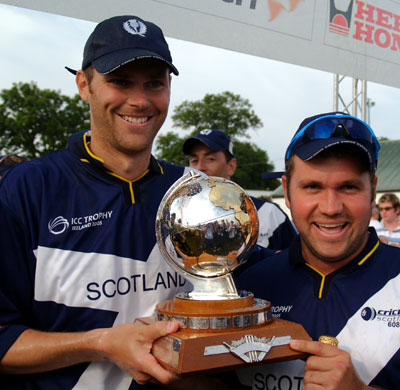Craig Wright was the glue that held Scottish cricket together in a glittering career with the Saltires.
A medium-pace bowler who caused batsmen trouble with the extra bounce gained from his height, he was also a fine late-order batsman capable of clearing the ropes at ease.
 Bowling against Ireland in the 2005 ICC Trophy Final (© CricketEurope)
Bowling against Ireland in the 2005 ICC Trophy Final (© CricketEurope)
He skippered Scotland 107 times between 2002 and 2007 – a golden time for Scottish cricket as they lifted both the ICC Trophy and the InterContinental Cup, cementing their place as the leading Associate nation at the time.
 Holding the ICC Trophy with Ryan Watson in 2005 (© CricketEurope)
Holding the ICC Trophy with Ryan Watson in 2005 (© CricketEurope)
Wright made his debut as a 23 year-old against Ireland in 1997, and over the next 12 years would prove the epitome of consistency with bat and ball in a side which grew into a formidable force.
Between 1997 and his retirement at the age of 35 following the 2009 T20 World Cup, Wright took 256 wickets at just 23.79, placing him second on the all-time Scottish aggregate list behind Majid Haq (258).
Highlights with the ball for the Greenock man were a five wicket haul against Worcestershire in just his seventh appearance, his 5-23 enough to secure a famous win in the Nat West trophy against county opposition, and as a bonus collect the Man-of-the-Match accolade.
Given the strength of the Scotland attack in this golden era, it’s perhaps not that surprising that he only had one other five wicket display, also against county opponents, taking 5-44 versus Somerset in 2004.That same year, he also took a hat-trick, as Scotland beat Denmark in the European Championships.
 Batting against Kenya in the 2007 World Cricket League in Nairobi (© CricketEurope)
Batting against Kenya in the 2007 World Cricket League in Nairobi (© CricketEurope)
While his place in the lower order of a strong batting line-up never afforded him many opportunities to showcase his batting ability, he did score seven half centuries on his way to 2621 runs at 20.48, placing him 17th on the all-time aggregate list.
His top score of 88 came against The Netherlands in their successful ICup campaign of 2004, while other fifties of note came against traditional foes Ireland, and Yorkshire in the 2007 Friends Provident Trophy.
He handed over the captaincy reigns following a disappointing 2007 World Cup campaign, where the first signs of an ageing Scotland sign began to show, and retired completed following the 2009 T20 World Cup in England – his 195 appearances see him Scotland’s fourth capped player, behind Richie Berrington, Majid Haq and Fraser Watts.
 Striking a boundary against Ireland in the 2007 Intercontinental Cup match in Belfast (© CricketEurope)
Striking a boundary against Ireland in the 2007 Intercontinental Cup match in Belfast (© CricketEurope)
Wright’s contribution was not confined to on-field activities, as he fulfilled a succession of administrative roles with Cricket Scotland, including marketing manager and performance development supremo, also serving Cricket Scotland as a senior coach, taking charge of youth teams and assisting Grant Bradburn with the national side.
He was instrumental in the resurgence of the national side as a change in direction saw players from the successful U19 side being given more opportunities to showcase their talent, and this promotion from within rather than seeking outsiders saw the Scots win the 2014 ICC Trophy in New Zealand.
 World Cup 2007: Scotland v Australia in St Kitts(© Ian Potts)
World Cup 2007: Scotland v Australia in St Kitts(© Ian Potts)
During his 19-year association with Cricket Scotland, the game went from a purely amateur set-up to an almost full time professional outfit. He stepped away from Scottish cricket in 2016, moving to Hong Kong saying at the time: “I feel it is the right time for me to take on some new challenges and explore other interests. Despite being a football loving boy from the West of Scotland, Scottish Cricket has been my passion since the first time I got the opportunity to play the sport as a 13-year-old, and has been a massive part of my life since then.
“I have been incredibly fortunate to have had some wonderful experiences in the sport as a player and coach during a time where cricket at Associate level developed beyond recognition. I am extremely grateful for the opportunities I have been afforded to be a small part of Scotland’s role in that, and I thank everyone who has helped and supported me during that time.”
 World Cup Qualifier 2009: Batting against Ireland in Benoni (© CricketEurope)
World Cup Qualifier 2009: Batting against Ireland in Benoni (© CricketEurope)
Wright’s influence on Scottish Cricket was immeasurable, with Performance Director Andy Tennant paying tribute to him on his departure.
“It is hard to put into words the size of the contribution Craig has made to the development of the game in this country – and especially as it was in so many different roles.
"His record as a player and captain speaks for itself. But more importantly for me is his incredible work ethic, drive and determination. His outstanding skill as a coach, who was so passionate about developing young Scottish players, will be his greatest legacy.
"I hope that one day we will see Craig back in the fold fighting hard, as he always did, to make Scotland successful.”
And so say all of us.
